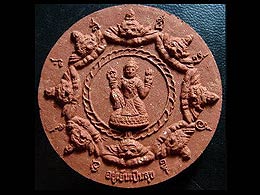Thais find new spiritual anchor in 'magical' amulets
by Ambika Ahuja, AP, August 8, 2007
BANGKOK, Thailand -- They can cost a small fortune, resemble '80s disco jewelry, and are arguably un-Buddhist, but many Thais seeking psychic insurance in troubled times are snapping up so-called Jatukam Ramathep amulets, coin-shaped talismans with supposed magical powers.
 << The Jatukham Rammathep amulet
<< The Jatukham Rammathep amulet
The Jatukam amulets, coveted by millions of people in Thailand - and available on EBay for those living elsewhere - have become big business, as believers, collectors and speculators drive a thriving market. Rare ones reportedly command prices of more than US$30,000.
The amulet craze has also led to robberies and at least one death, when a crowd stampeded for the opportunity to get a limited edition.
As Thailand muddles through political insecurity and nervousness about the economy, people are more openly grasping at supernatural aids. The fad vividly illustrates how belief in astrology, the occult and animism remain a major part of a modern, industrialized Thailand.
The amulets are typically the size of a silver dollar, and come in a variety of colours, including bronze, silver and clay.
Prices depend on the materials used, the circumstances under which they were anointed - some were recently taken aloft on a jetliner to be blessed by monks - and how rare the model is.
It is not unusual for them to be encased in a gold frame hanging from a heavy link chain around the neck and worn outside the shirt - an awkward fashion statement, at best.
Many Thais carry or wear amulets, usually small ones depicting images associated with Buddhism, the religion of most Thais, though amulets are not formally part of its doctrine.
Most amulet owners are fairly discreet, wearing them under shirts and blouses. Serious believers carry more than one and as many as a dozen, though such ostentatiousness is usually associated with policemen and criminals - who understandably seek all the protection they can get.
But Jatukam amulets are everywhere; affluent businessmen, political protesters, teachers in the insurgency-wrecked south, curbside food vendors, all wear them proudly with the shared hope that they will ward off danger and attract good fortune.
“I was in a number of car accidents before. Once I started putting these amulets in my taxis and around my neck, my car has been safe no matter how many hours I am on the road each day and how tired I am,” said Surasak Mansee, a Bangkok taxi driver, who has three amulets draped on his rearview mirror and two more around his neck.
“I don't know what you think, but my wife has also won some lotteries and we are happier than ever,” he said.
“People turn to superstition when they feel that religion and other social as well as judicial systems are no longer providing them the security and justice they need,” said respected archeologist Srisak Vallibhotama. “It's a reflection of the kind of society we live in.”
Although Buddhism promotes achieving inner peace through detachment from desires, many Thai who profess themselves adherents practise a spirituality that targets material gain as much as inner tranquility.
Different variations of the Jatukam amulet focus on the promise of wealth and prosperity, such as the “Super Rich,” “Immediately Rich,” “Rich Without Reason” and “Miracle Rich” models.
“The names are as important as how they are made and promoted. The producers know what the demands are and they have to match those demands. People want protection and people want wealth,” said Niti Pakawan, an anthropologist at Bangkok's Chulalongkorn University.
Jatukam Ramathep amulets were named after a legendary warrior prince of an ancient southern Thai kingdom who is usually depicted on the talisman in a seated position. The original batch were made in the southern province of Nakhon Si Thammarat in 1987 to raise funds to build a new city pillar, which marks the founding site of a city.
These originals were priced at less than 50 baht (then worth $2) each when they came out. Now, they can fetch more than 100,000 baht ($3,200), according to vendors.
The Jatukam amulets became a true nationwide phenomenon after their original creator, Police Maj. Gen. Khunphantarak Rajadej, died at the age of 104 last year - which also saw political turmoil that led to the country's first coup in 15 years, pushing out elected Prime Minister Thaksin Shinawatra.
But at least one well-known monk derides the fad.
Phra Payom Kalayano, the abbot of a temple in the Bangkok suburb of Nonthaburi, produced chocolate cookies that resembled the amulets and called them “Four bites.” Stamped on them are four of the Buddha's teachings on how to become wealthy.
“I want to remind people that becoming rich is about discipline and hard work, not magical amulets. If it is really magical, why would the monks share it with you and not keep it to themselves and make money for the temples?” he said.

 << The Jatukham Rammathep amulet
<< The Jatukham Rammathep amulet